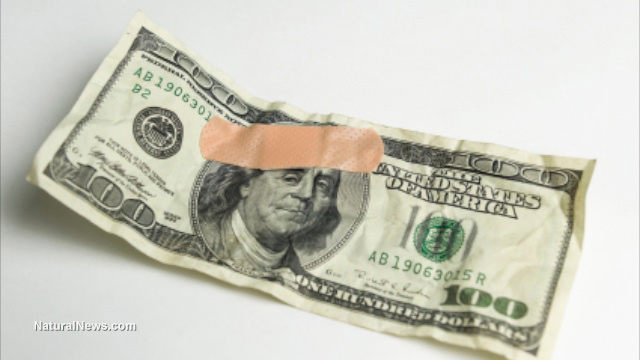Nations of the world are drowning in debt, and a massive global avalanche of debt default is now imminent
Wednesday, January 06, 2016 by: J. D. Heyes
Tags: financial collapse, debt bomb, Mexico

(NaturalNews) The global economy may be about ready to take a massive hit if a series of imminent crises converge in just the right – or actually just the wrong – way.
As reported by SHTFPlan.com, global debt has been steadily rising for years, and as that has happened, conditions for a debt avalanche have been created. "Once it accumulates enough mass, and momentum is not sufficient to stop its collapse, it overwhelms its host, and will come crashing down on the rest of the system, too," Mac Slavo reported for the site.
Around the world, Slavo says, there are literally hundreds of governments on the local, state and national level, including not a few businesses and private households, heavily indebted and reaching the point of no return. Already heavily in debt, many of these entities are set to default on the repayment of loans (many of which were made to keep nations afloat to begin with). When that happens, there will be a series of debt crises that will result in market chaos and a dramatic tightening of credit for nations and those in the private sector who are deemed most vulnerable.
Chain reaction of debt
Last month, fears grew that Puerto Rico was set to default on a massive loan payment – something that did not happen, but remains a possibility. On Dec. 1, Puerto Rican Gov. Alejandro Garcia Padilla told the Senate Judiciary Committee that the Caribbean island protectorate was essentially out of money, saying, "Let us be clear, we have no cash left." So without congressional action, the government there is likely to default.The U.S. government likely won't let that happen, instead opting to burden taxpayers with another bailout, thus perpetuating the failed socialist experiment on the island that has seen its government overspend on welfare services and public pensions, leaving it about $73 billion in debt. But, as Slavo noted, Mexico is also "ready to crash and bracing for impact."
As noted further by Wolf Street in August, corporate debt is also becoming a major problem:
"In the emerging markets, private-sector debt has become a doozie: In 2014, EM non-financial corporate debt reached a record high of 83% of GDP, up from 67% in 2009. The problem is that part of this debt is denominated in a foreign currency. ...
"The countries that have seen the largest increases in non-financial corporate indebtedness are China, Brazil, and Turkey. But Mexico is not far behind. According to a new report in El Financiero, in the first half of 2015 the total debt of a sample of 50 publicly listed companies had risen 22% year-over-year.
"The main reason? The peso's decline against the dollar."
'Domino of debt bomb explosions'
The website further reported that in August, the bonds of the country's largest construction company, ICA, became the worst-performing corporate bonds in all emerging markets, and things have only gotten worse since. In early December – about the time Gov. Padilla was testifying before a Senate committee – ICA's shares fell 22 percent in a single day, following news that the company would utilize a 30-day grace period to make a $31 million interest payment that was due that week. In subsequent days, the company's shares fell even further to their lowest point in 21 years.Financial analysts are not confident the company will be able to make its payment early in January, either – after the grace period expires.
"Do I think they're going to pay within 30 days? No," said Carlos Legaspy, a money manager at InSight Securities that holds ICA bonds due in 2017, 2021, and 2024. "The 30 days are not going to make any difference."
Slavo notes that "the real danger" is that ICA's failure begins a series of debt collapses around the globe, as weak, heavily indebted companies "create a domino of debt bomb explosions that risk taking the whole thing with it in a brilliant fiery scene of destruction."
Sources:
SHTFPlan.com
ZeroHedge.com
TheHill.com
WolfStreet.com
Financial collapse at FETCH.news
Get independent news alerts on natural cures, food lab tests, cannabis medicine, science, robotics, drones, privacy and more.
Take Action: Support Natural News by linking to this article from your website
Permalink to this article:
Embed article link: (copy HTML code below):
Reprinting this article:
Non-commercial use OK, cite NaturalNews.com with clickable link.
Follow Natural News on Facebook, Twitter, Google Plus, and Pinterest
- New study links mRNA vaccines to GENETIC CHANGES - and not the good kind
- Fauci is back in the limelight, and he’s busy promoting a future COVID or FLU pandemic
- Tulsi Gabbard leads charge against the Biden regime’s global censorship of the 'Disinformation Dozen'
- A comprehensive guide to DANDELIONS, an ancient herbal medicine and superfood
- Aerosolized bioweapons? Strange “diploid biomasses” falling out of the sky in Florida captured under the microscope
- DEADLY FLU JAB WARNING: New flu vaccines make recipients 27 PERCENT MORE LIKELY to catch the flu
- How Israeli military-connected corporations are secretly controlling your online privacy
- Idaho Gov. Brad Little signs Medical Freedom Act banning vaccine mandates
- Analysis: The coming economic collapse, a mass uprising and Trump's three secret weapons to halt the growing revolt
- Kiss Your Genetic Privacy Good-Bye! 23andMe Gets Green Light to Sell Your Intimate Genetic Details to Anyone They Want
- U.S. lawmakers investigate Meta over alleged China collaboration
- DEATH BY DOCTOR: Why and how doctors are now PAID TO KILL their patients
- Tulsi Gabbard takes aim at censorship: Justice for the ‘Disinformation Dozen’
- Widespread social and economic unrest: Steve Quayle issues urgent financial warning of imminent asset collapse in new interview with Mike Adams
- Curcumin’s ancient healing power supercharges muscle recovery, and its effects are compounded with anti-inflammatory foods and supplements
- CIA Official Terry Adirim TERMINATED for her role in pushing unlawful vaccine mandates on the military
- Mike Adams releases country western hit single: Goin’ Back in Time is Comin’ Home
- Trump’s EPA reviews fluoride safety amid growing concerns over risks to children’s health
- Aerosolized bioweapons? Strange “diploid biomasses” falling out of the sky in Florida captured under the microscope
- Analysis: The coming economic collapse, a mass uprising and Trump's three secret weapons to halt the growing revolt
- Kiss Your Genetic Privacy Good-Bye! 23andMe Gets Green Light to Sell Your Intimate Genetic Details to Anyone They Want
- Widespread social and economic unrest: Steve Quayle issues urgent financial warning of imminent asset collapse in new interview with Mike Adams
- Defunding DEADLY mRNA jabs: Government funding for mRNA technology being scrutinized and sidelined until proven "safe and effective" for real
- CLOT SHOT PLANDEMIC UNFOLDING: Fibrous, rubbery clots caused by covid injections have prion-like seeding activity
- European Court of Justice: Healthcare professionals who promoted or administered COVID-19 vaccines are CRIMINALLY LIABLE for any harm caused
- Mike Adams releases country western hit single: Goin’ Back in Time is Comin’ Home
- DEATH by VACCINE or face PRISON time: Canadian Freedom Convoy leaders CONVICTED for protesting forced vaccination during the Covid Plandemic
- Newly released JFK files reveal Pentagon's role in creating Lyme disease and covid in the same lab
- “Project Aldrin”: Senate probes Meta's alleged censorship dealings with China
- How Israeli military-connected corporations are secretly controlling your online privacy
- The hidden war above: Chemtrails, HAARP and the battle for planetary control
- Federal employees whine over DOGE's new directive requiring them to do a 5-point summary of weekly accomplishments
- FBI imposed gag order on agents to silence Hunter Biden laptop truth before 2020 election, new chat logs reveal
- Tulsi Gabbard leads charge against the Biden regime’s global censorship of the 'Disinformation Dozen'
- U.S. approves new Russian ambassador as diplomatic thaw continues
- I Want My Bailout Money – new song released by Mike Adams
- Newly released JFK files reveal Pentagon's role in creating Lyme disease and covid in the same lab
- Mike Adams releases country western hit single: Goin’ Back in Time is Comin’ Home
- Dr. Mike Yeadon releases 15-minute testimony - WATCH - about genocidal intent of COVID “vaccines”
- The Health Ranger releases “Vaccine Zombie” song and music video, using AI-animated zombies for the music video
- California's social media censorship law struck down: A victory for free speech or a threat to online safety?
- EPA advisor admits the agency is funneling billions to climate groups ahead of Trump’s return to White House
- Rep. Nancy Mace introduces bill to ban biological males from female facilities on federal property
- OpenAI whistleblower who dissented against how the company trained ChatGPT found dead
- Survival 101: Effective EMF blocking techniques
- Analysis: The coming economic collapse, a mass uprising and Trump's three secret weapons to halt the growing revolt
- MEDICAL BOMBSHELL: FDA admits Covid mRNA 'Vaccines' CAUSE CANCER
- CONSERVATIVES SOUND THE ALARM: Big Pharma and the Left trying to force $32 billion money grab from America’s seniors into year-end spending deal
- Florida takes a stand: DeSantis proposes permanent ban on mRNA vaccine mandates
- Sugarcane extract superior to cholesterol-lowering drugs?
- Pilots report mysterious lights 'moving at extreme speeds' across Oregon skies
- Trump reverses course on Gaza plan, says “nobody is expelling Palestinians”
- 5 Simple steps to boost your brainpower: How to strengthen executive function in a distracted world
- Trump Administration cuts 2,000 USAID jobs, places most employees on leave in sweeping reform effort
- Red Cross issues warning to stop blood plasma donations from vaccinated people
- Scientists confirm: GENIUS brain function can be spontaneously unleashed in humans without any apparent cause
- EPA advisor admits the agency is funneling billions to climate groups ahead of Trump’s return to White House
- HYSSOP: What research reveals about the health benefits of this ancient holy herb
- Two containers with completed ballots fall out of truck in Florida
- Fully vaccinated about to see “tsunami” of illness and death, warns virologist
- Global leaders unite to clamp down on “misinformation” with UN-backed Cascais Declaration
- Newly released JFK files reveal Pentagon's role in creating Lyme disease and covid in the same lab
- BREAKING: 2025 NDAA authorizes mandatory military draft of WOMEN across America… as Pentagon pursues global NUCLEAR war with both Russia and China at the same time
- Michael Yon warns of a ZIONIST TAKEOVER in Trump’s second administration
- Ozempic and Wegovy weight loss drugs are injectable LIZARD VENOM PEPTIDES that may unleash a devastating wave of organ failure… side effects align with symptoms of SNAKE BITES
- The Health Ranger releases “Vaccine Zombie” song and music video, using AI-animated zombies for the music video
- BOMBSHELL: DNA testing kits are a SCAM to develop ethnic-specific bioweapons
- Israeli soldiers accused of even more torture and abuse in the West Bank
- These 13 countries just signed an agreement to engineer a global FAMINE by destroying food supply
- NASA admits that climate change occurs because of changes in Earth’s solar orbit, and NOT because of SUVs and fossil fuels
- RFK Jr. clears key hurdle: Sen. Susan Collins backs controversial HHS nominee, signaling a new era for health policy
- Sermon 30: How Jesus reveals Caesar’s FAKE CURRENCY and FALSE AUTHORITY
Science News & Studies
Medicine News and Information
Food News & Studies
Health News & Studies
Herbs News & Information
Pollution News & Studies
Cancer News & Studies
Climate News & Studies
Survival News & Information
Gear News & Information
News covering technology, stocks, hackers, and more



"Big Tech and mainstream media are constantly trying to silence the independent voices that dare to bring you the truth about toxic food ingredients, dangerous medications and the failed, fraudulent science of the profit-driven medical establishment.
Email is one of the best ways to make sure you stay informed, without the censorship of the tech giants (Google, Apple, Facebook, Twitter, YouTube, etc.). Stay informed and you'll even likely learn information that may help save your own life."
–The Health Ranger, Mike Adams












































